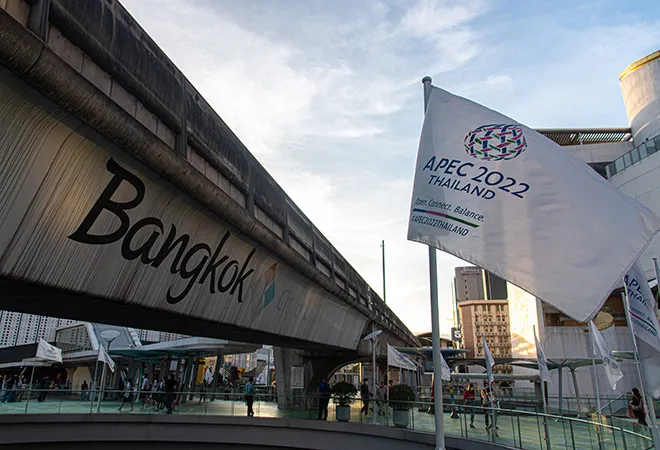-
CENTRES
Progammes & Centres
Location
Though the BCG model has many positives, it is yet to be seen if it is as sustainable as it claims to be.

The month of November saw a series of important summits being held in the Southeast Asian region such as the Association of Southeast Asian Nations (ASEAN) Summit and East Asia Summit in Cambodia, the G20 in Indonesia, and lastly, the Asia-Pacific Economic Cooperation (APEC) in Thailand. This year as the chair of APEC, Thailand had the opportunity and responsibility to host the summit on 18-19 November 2022, before handing the presidency over to the United States. Thailand's theme for APEC in 2022 was “Open. Connect. Balance”, indicating the key deliverables it envisions namely; “opening the region to opportunities, connecting across all dimensions, and helping achieve balance in all aspects”.
The meeting saw participation from the ASEAN, the Pacific Economic Cooperation Council (PECC), and the Pacific Islands Forum (PIF). It was particularly significant since top leaders such as Chinese President Xi Jinping, US Vice President Kamala Harris, and Japanese Prime Minister Fumio Kishida attended and various bilateral meetings were held on the sidelines of the Summit.
The implementation of the APEC Connectivity Blueprint (2015-2025) was encouraged to improve and enhance connectivity and sustainable tourism.
The continued implementation of APEC Putrajaya Vision 2040 was re-emphasised among the member nations. It envisions the enhancement of three pillars namely, trade and investment; innovation and digitisation; and strong, sustainable, inclusive growth of the region, through the Aotearoa Plan of Action, to realise an open, dynamic, resilient, and peaceful Asia-Pacific community by 2040.
There were a number of issues that dominated the discussion among which the Russia- Ukraine war featured quite significantly. Aside from this, economic issues also dominated the talks, and momentous progress was made as a multi-year work plan for a Free Trade Area of the Asia-Pacific (FTAAP) was decided to be advanced., The APEC Internet and Digital Economy Roadmap (AIDER) was also put forward to accelerate the implementation of new and emerging technologies.
The implementation of the APEC Connectivity Blueprint (2015-2025) was encouraged to improve and enhance connectivity and sustainable tourism. The Safe Passage Task Force was proposed in this regard to ensure safe and seamless cross-border travel.
To encourage economies to continue efforts to remove barriers to logistics-related services, Phase Three of the Supply Chain Connectivity Framework Action Plan was endorsed by the APEC ministers. Along with this, an implementation plan for food security by 2030, combating illegal and unregulated fishing, and encouraging women to hold suitable positions in economies were some of the action plans worth mentioning.
Hosting APEC has been important for Thailand as it proved to be a stepping stone in establishing its mark within the other Southeast Asian neighbours and expanding its tourism and investment opportunities. It also provided Bangkok with an international platform to endorse its Bio–circular–Green economy (BCG) model. BCG includes a bio-economy wherein renewable resources need to be produced and converted into value-added products that benefit the economy.
There was a general protest on the inaugural day of the APEC, where around 300 youths and farmers assembled near the Royal Palace to stage protests against the BCG as they fear that the state will requisition their land to incorporate the concept of large farming and carbon credit schemes run by multinational companies.
Under the ‘Be the Change’ initiative—one of the programmes designed by the Thai ministry to promote the BCG model—the identification of BCG heroes i.e., companies and institutions have been assessed on four points: The use of waste products and materials; the value brought to biomaterials; an eco-friendly process of production; optimal use natural resources. As part of the initiative, 50 companies have been chosen as heroes and more are in the process of identification, to be put on a global platform where green technology is used.
A THB41 billion budget has been incorporated to realise the vision initially by 2027, and thus, has been made into a national agenda. The aim is to meet 24 percent of GDP in five years.
The APEC was hosted amidst severe political distress as many protests by the youth and local farmers were taking place across Thailand. There was a general protest on the inaugural day of the APEC, where around 300 youths and farmers assembled near the Royal Palace to stage protests against the BCG as they feared that the state would requisition their land to incorporate the concept of large farming and carbon credit schemes run by multinational companies.
The police cracked down on protestors; many, including adolescents, were apprehended, and rubber bombs were used to diffuse the situation. Such arrests and use of force have been ongoing since 2020. This has further enraged the people to stop this initiative, advocating for the Prime Minister to step down.
According to Greenpeace Thailand, an international NGO, the BCG scheme as advocated by the Thai ministry is connected to climate change with big corporations’ interests, as the government planned to give concessions to companies to grow huge plantations for carbon credit trading. It is supposed that the requirement for a plantation can be 96,000 hectares of land. Demand for such huge areas of land will automatically lead to conflict with the local community.
It has been identified by analysts that knowledge and technology will be required to create a successful model and that BCG needs adequate funding for creating a suitable knowledge pool and tools to enhance the system.
There is a need to assess whether BCG can be a solution to a sustainable economy and if so, what are the challenges that need to be mitigated for it to be a successful programme. It has been identified by analysts that knowledge and technology will be required to create a successful model and that BCG needs adequate funding to create a suitable knowledge pool and tools to enhance the system. Thus, suggestions have been put forth to increase annual funding to multi-year funding. Also, a shift from funding individual projects to integrated projects has been forwarded.
Moreover, transferring knowledge to the local community will be essential to endorse this process at the community level. There is a lot of anxiety and anger among people against the military government and anything endorsed by it will be taken negatively if local campaigns for awareness and questions raised are not addressed adequately and appropriately.
It also remains to be seen whether the APEC nations will endorse the BCG Bangkok model in their own nations.
The views expressed above belong to the author(s). ORF research and analyses now available on Telegram! Click here to access our curated content — blogs, longforms and interviews.

Sreeparna Banerjee is an Associate Fellow in the Strategic Studies Programme. Her work focuses on the geopolitical and strategic affairs concerning two Southeast Asian countries, namely ...
Read More +